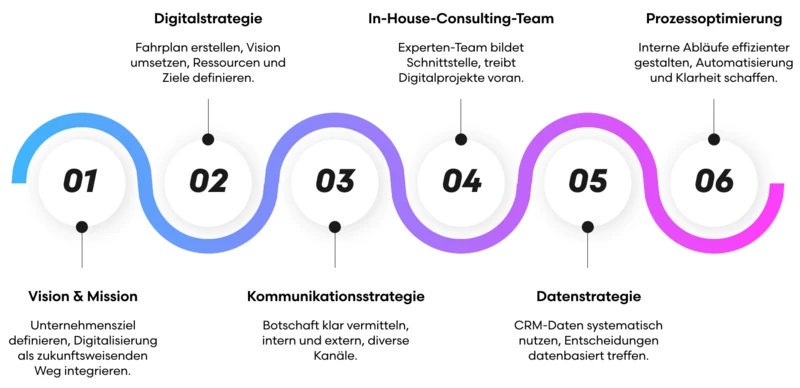
Business model development
Digital transformation
Middle class
Digital strategy & diversification for a medium-sized family business
In this project MORGEN a medium-sized family business in its diversification and digital strategy in order to develop innovative business models that open up long-term growth opportunities. Targeted measures were used to tap into new sources of income and implement digital strategies that contribute to securing the company's sustainable future.
Client anonymized
Family-run medium-sized company specializing in the sale of high-tech equipment.
A family-run medium-sized company specializing in the distribution of technological equipment. With an annual turnover of over 100 million euros and more than 500 employees worldwide, it has exclusive distribution and brand rights and a dominant market position. The company faces the challenge of expanding its digital capabilities in order to strengthen its competitiveness and effectively exploit future market opportunities.
Initial situation:
Internally established processes limit growth.
Sales barriers reduce scaling potential in the core business.
- Product presentations limit choice and rely heavily on sales intuition during customer visits.
- The lack of data on non-presented products leads to information gaps and potentially missed sales opportunities.
- The predominant use of traditional communication channels limits scalability and hinders an efficient digital sales strategy.
Digitization deficits slow down growth.
- Manual core processes are heavily based on individual expertise, which entails inefficiencies and risks of knowledge loss.
- The current business model must adapt to digital offerings , which requires strategic realignment.
- Despite traditional communication channels , the modern business world requires digitalized internal and external communication.
High dependence on cooperation partners.
- New market players and manufacturers' direct sales strategies are threatening exclusive distribution agreements.
- The strong specialization increases the susceptibility to market fluctuations in this segment.
- A damaged reputation could jeopardize the essential cooperation with manufacturers and undermine
the business model. - The business model is heavily dependent on the quality and attractiveness of its exclusive brands.
MORGEN Performance
Digital strategy
Digitization
Revise strategies and processes -Fully exploit the potential of digitalization.
Clear overall strategy: Formulation of a precise, tangible target image that serves as a guide for the company's development.
Digital strategy: A clear framework for digitalization that ensures that all digital initiatives are aligned with the company's overall strategy.
Measurable digitalization goals: Setting specific, measurable goals for digital transformation that enable targeted monitoring and control.
Targeted data strategy: Development of a clearly defined data strategy that is based on the company's strategic goals and optimizes the use of data.
Establishment of an in-house consulting team: strengthens internal expertise and effectively accelerates the implementation of new digital strategies.
Increased efficiency through digitalization: Implementation of a lean, repeatable process along the customer journey that improves efficiency and customer experience.
Digital strategy approach

Vision and principles of digitization
Clear vision and mission as the basis of the digitalization strategy.
Coordination with key departments and management
External and internal communication of the vision and mission for clarity and credibility.
- Culture assessment: In the company with employee interviews and workshops to capture the corporate culture and values.
- Strategy workshops: Two full-day workshops with managing directors to develop the overall strategy, values and sub-goals.
- Formulation workshop: Half-day workshop for the final formulation and discussion of immediate measures.
Strategic implementation
Roadmap for translating the vision into concrete measures.
Clearly defined goals, KPIs, resource planning and schedules.
Effective communication of the digital strategy internally and externally.
- Goal-setting workshop with management: All-day workshop to determine the digitalization goals, derived from the overall strategy.
- Coordination with IT department: full-day workshop to define KPIs and implement tracking systems; management introduces topic.
- Strategy development and channel selection: Full-day workshop with the communications team to develop the communications strategy and select suitable channels.
- Elaboration of the communication content: Full-day workshop for detailed planning of specific communication content and measures.
Teams and processes
Establishment of an in-house consulting team for implementation and coordination.
Identification and implementation of quick wins.
Bootstrapping new processes along the customer journey.
- Team formation for change process: Formation of an interdisciplinary in-house consulting team that is responsible for implementing the change process.
- Joint project work: The team works together on a project to develop the process and learn the necessary skills in a reproducible manner.
- Method development: Development of methods for evaluating the usefulness of process changes and their implementation.
- Guideline creation: After the first project, creation of a guideline for planning time and capacities, measurement of overall digitization.
This digital strategy takes a top-down approach. First, we concentrate on the strategic level in order to create a solid foundation. The focus of this project is to achieve measurable improvements and direct increases in sales through the integration of digitalization.
MORGEN Performance
Diversification
Business model development
Spreading risk through diversification: creating secure prospects for the future
New sources of income: Identifying and developing new sources of income through innovative, future-oriented business models and digital transformation.
New market segments: Opening up new market segments through digital platforms and services that go beyond traditional offerings.
Long-term business security: Identification of new brands that serve as the basis for the long-term existence and business foundation of .
Innovation-driven business models: development of new digital offerings and services based on current market trends and customer needs.
Strategic market positioning: Identification of optimal market segments and positioning in order to increase competitiveness and market visibility.
Effective partnership strategies: Identifying and establishing strategic partnerships that lead to improved market access and increased sales.
Diversification approach

The key to future viability
Diversification as a key element for stability.
Careful analysis of diversification opportunities.
Identification of new growth areas and minimization of the risk profile.
- Market understanding and analysis: market definition and segmentation, market size and growth, customer analysis, competitor analysis
- Strategic evaluation and planning: SWOT analysis, industry trends and dynamics, price analysis, distribution channels and supply chain.
- Market position assessment: Clear assessment of your own position compared to the competition, which creates the basis for differentiated competitive strategies.
- Risk and opportunity identification: Identification of market opportunities and risks in order to take proactive rather than reactive measures and strengthen the company's resilience.
- Strategic decision-making: Providing a detailed analysis to support strategic targeting of new market segments and identify growth potential.
- Action-oriented insights: Developing an action-oriented view that enables specific measures to realize identified market opportunities.
New business areas and market segments
Exploring new digital business models.
Strategic focus on a specific sector(anonymized).
Opportunities in stable and less seasonal market segments.
- Immersion in the XXXXXX market (anonymized): Analysis of market trends and customer needs to identify niches, with a focus on strategic partnerships and multipliers for effective market development.
- Product strategy, implementation and positioning: Integration of product strategy development and positioning work, structuring of content creation and implementation planning to strengthen brand presence.
- Evaluation of digital business models: Based on existing market and competitive analyses, discussion and evaluation of potential digital business models to expand the offering.
- Concept development and integration: Development of specific digital business model concepts, including definition of prototypes and pilot projects, taking into account integration into existing business models
- Strategic market positioning: Identification of optimal market segments and positioning to increase competitiveness and market visibility.
- Effective partnership strategies: Identification and establishment of strategic partnerships that lead to improved market access and increased sales.
Implementation and brand strategy
Use of pilot projects for controlled tests of new approaches.
Professionalization and digitalization of active sourcing of new brands.
Maximizing value and creating a solid foundation for future growth.
- Professionalization of the sourcing process: Development of a structured, systematic approach to sourcing new brands, including digital tools and methods.
- Digital strategies in sourcing: Integration of digital resources and analysis tools for the efficient identification and evaluation of potential new brands.
- Digitally supported market analysis: Use of digital analysis tools for efficient and comprehensive market research, optimizes brand evaluation.
- Long-term business protection: Identification of new brands that serve as the basis for the company's long-term existence and business foundation.
- Minimizing missed opportunities and risks: Reduction of risks and missed opportunities through systematic market analyses and data-based decisions.
Business model development
Services in the project
Market expansion
Exploration and development of new business areas.
Exploration and development of new business areas.
Product development
Design and improvement of products or services.
Design and improvement of products or services.
Customer understanding
Deep immersion in customer needs and wishes.
Deep immersion in customer needs and wishes.
Market tests
Practical tests and analyses for market validation.
Practical tests and analyses for market validation.
Innovative pricing
Revision and introduction of modern pricing models.
Revision and introduction of modern pricing models.
Digital transformation
Integration of digital processes and technologies.
Integration of digital processes and technologies.
Value proposition
Value-oriented strategies to increase sales.
Value-oriented strategies to increase sales.
Innovation
Idea development through to profitable business models.
Idea development through to profitable business models.
Sustainability
Business practices that meet all ESG criteria.
Business practices that meet all ESG criteria.
MORGEN develops business models for SMEs
Start
TOMORROW
Start
with MORGENM
with MORGENM
Jonas Reuter
Managing Director, Partner
